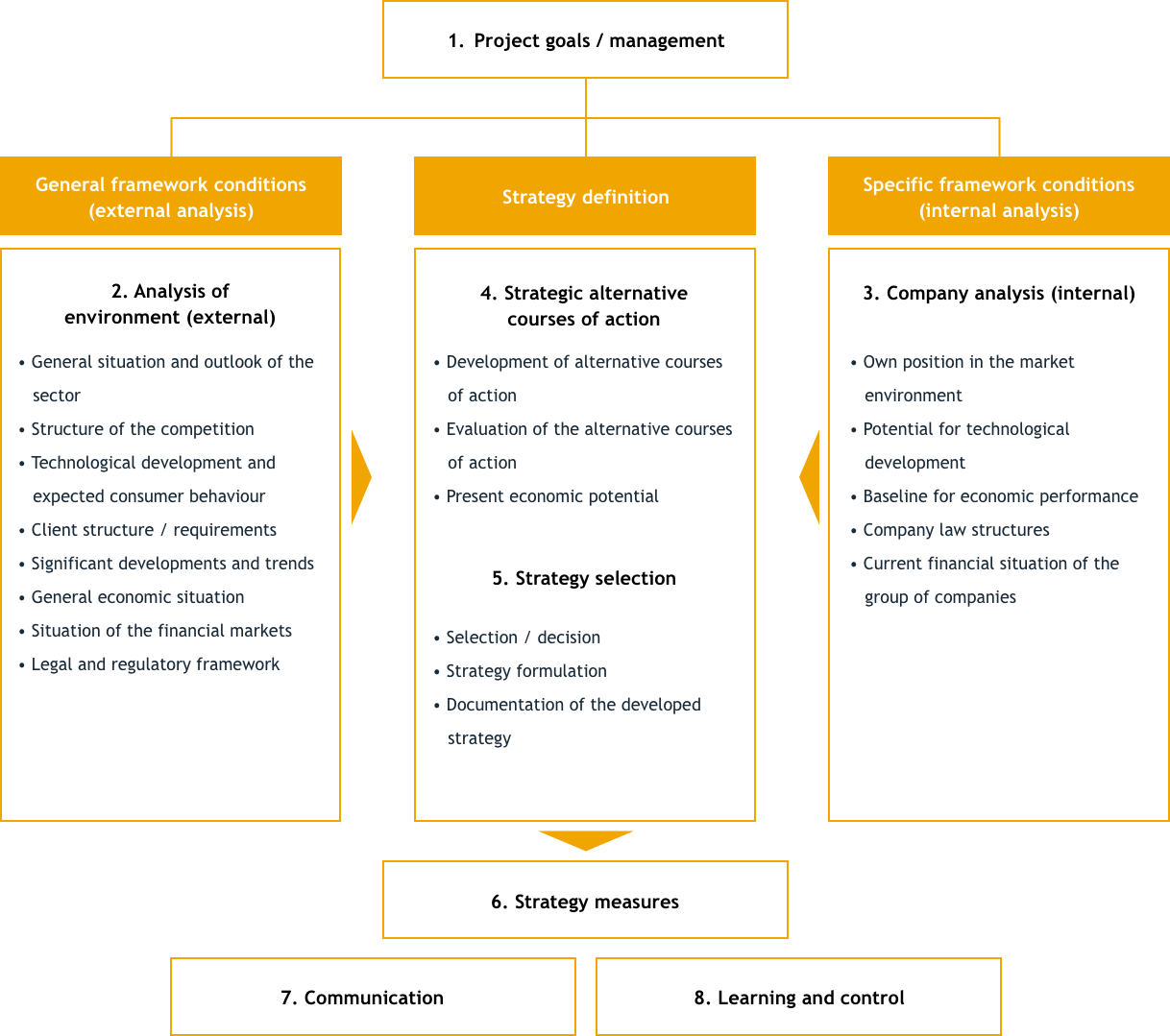
Strategy workshops and strategy development processes
The success of your company depends 80% on your strategy and only 20% on your operational performance. This was the finding of the Sankt Gallen Management Institute after evaluating a variety of scientific studies. Despite the many factors that could certainly put the exact measurement of business success into question, the importance of strategy regarding business success is nevertheless evident. Most of those who carry responsibility in a company are aware of this.
The high value of formulating a strategy lies with the fact that action can be taken today with an eye on the future. In other words, we can implement changes today in order to ensure success in the long term. The goal of any strategy formulation is to position the business in existing or new markets on the basis of its strengths and competencies, thereby justifying its existence in relation to the competition, also in the long term and by creating a value premise for its customers.
Instead of struggling in the wrong direction, the business strategy ideally provides the right direction and essentially serves the following purpose:
1. To determine the framework for future decisions
2. To provide orientation and clarity for employees (and thereby also the motivation and clarity of tasks for every single employee)
3. To prioritise the allocation of resources (framework for investments, budgets and staff deployment)
To date, a mostly intuitive approach to strategy development in small and medium-sized enterprises
In practice, we often experience that the entrepreneur or the entrepreneurial managing director take an intuitive approach to strategy formulation in German small and medium-sized enterprises (SMEs). These individuals normally have vast experience and knowledge of the markets, of their competitors as well as their own company and often intuitively adapt their business strategy during market changes as part of the latest decisions that need to be taken. In our view, this intuitive approach, which is based on experience, remains an important driver of success for the strategy adaption of SMEs.
At the same time, however, the dynamics as well as the intensity of external changes, especially technological changes in the global market environment, and the role of a company’s strategy as a factor for orientation and motivation of the increasingly connected employees, are growing. Where before smaller intuitive adaptations had to be made on a smaller scale and larger adaptations were only necessary every five to seven years, the need for the overall scale and speed of adaptations has clearly increased.
Based on the increasing speed and complexity of change, German SMEs will have to strengthen their intuitive approach with a structured process of strategy formulation, which will have to include the different perspectives of their managers as well as external factors.
Challenges due to limited resources and methodological experience in SMEs
As part of the long-term support of our clients, we have observed that the need for a continuous strategy development process is often acknowledged in SMEs, but these have to contend with specific challenges in the process of strategy formulation:
- No clearly defined process with implementation dates (daily business gets prioritised)
- No availability of own resources for the implementation of the strategy formulation process (time, experience, methodology)
- Low acceptance in line management occurs frequently (added value is called into question)
- No clear communication of the strategy in the organisation and to employees
- Limited access to market data and information (market research)
- Spreading of risks with SMEs is often more difficult (options for action are limited if compared to big corporations)
Supportive approach to solutions by means of a continuous process which is divided into work steps
At first glance a structured work process seems like a huge task. But it is our opinion that with the correct methodology - if divided into smaller subtasks - and a basic understanding that strategy formulation is a continuous, recurring process, the process of strategy formulation can also be handled by SMEs.
With effective prioritisation, it is usually possible to find a balance between manageable effort and relevant benefit in the structured strategy formulation process:
- Setting a framework: project goals and project organisation
Identification of key issues, correct prioritisation of these and a clear limitation of the overarching project goal form the basis of a successful strategy formulation process – this should be the first step which the project team should deal with decisively, after which the formulation of clear statements relating to these should follow.
- Assessing the future: analysis of the external environment in respect of risks and opportunities
As part of a first workshop, a common assessment of how relevant markets (incl. other competitors) could develop in the future, is formulated. The focus of the external analysis is placed on the important risks and opportunities in the markets that were looked at, the identification of new and attractive future markets and deriving what the critical success factors of these markets would be. As a follow-up to the workshop, the assessment, which was jointly developed, should be validated as much as possible with information (which often is only available to a limited degree in the market), or be corrected where this is necessary. A competitor analysis including Porter's 5 Forces and the PEST analysis (political, economic, social, technological) are good tools to support a systematic external analysis.
- Analysing your own company: clear identification of your own strengths and weaknesses
Apart from looking at external influencing factors, it is necessary, as part of strategy formulation, to cast a glance into the “inner working” of the company in order to analyse your own strengths and weaknesses and to identify them clearly. Here special focus must be placed on the fulfilment of the critical success factors of the market environment as derived in point no. 2. How well does it meet the significant requirements of the clients, or how will the key competencies meet these in the long term? Apart from the qualitative evaluation (e.g. as part of the first workshop), the assessment should be supported by internal indicators and, where applicable, by external benchmarks. As a summarising instrument of analysis, the SWOT analysis as the combination of a company’s profile of its own strengths and weakness and the consideration of external opportunities and risks (see step 2) has proven particularly reliable.
- Finding strategic alternatives for action: development of different strategic alternatives
The results of the SWOT analysis serve as a basis for the derivation of individual courses of action and their bundling in overarching strategic paths through which the different strategy alternatives are demonstrated, whose economic potentials are to be evaluated in the following with an assessment of opportunities and risks. The Ansoff Matrix for idea generation and a portfolio (or BCG) matrix for evaluation have proved to be particularly helpful tools for us in this step.
- Selecting a strategy: choosing a strategy with the biggest promises of success
The next step is to decide which strategic alternatives for action should become part of the overall strategy. The chosen strategy should:
- build on strengths (“strengthen your strengths”),
- utilise concentrated resources (not scattered),
- generate clear competitive advantages and contain innovative components (new values)
- be clearly structured and feasible
- have reasonable risks
- Operationalise the strategy: derivation of a strategic action plan with responsibility
After having defined the strategy, it must be implemented consistently as this a particularly essential factor for success. For this, concrete steps must be derived from the overall strategy to operationalise the strategy and transfer this into the company. Here it is important that responsibilities, goals (qualitative and quantitative), and timelines are set for every measure to be taken. It might be necessary to align the organisational structure to the new strategy and to introduce active change management.
- Communicating strategy: announcement of the strategy among internal and external stakeholders
It is now the task of management and managers to represent the new strategy convincingly and to provide active support for its implementation. Here, consistent communication that is appropriate to the target group is needed. At first, managers must get detailed information about the overall strategic orientation and the resulting changes for the company. Thereafter, all employees should be informed in as short and precise a manner as possible about the corner pillars of the strategy (“who are our target groups” and “what do we represent”). The presentation of the strategy should be communicated in a uniform way by managers and management and should over time remain the same until an alignment has been jointly adapted.
- Learning and controlling: regular control of measures and strategy review
To ensure complete implementation and application in the entire company, it is essential to put in place regular measurement control (adherence to defined timeframes and effectiveness) of the strategic key measures, which must be undertaken by a responsible driver of the process (responsible person in the company or an external person). As strategies have an increasingly shorter lifespan in the market environment, this person should also be responsible for the preparation and initiation of the annual review of the existing strategy and the introduction of a strategy adaptation process.
Experiences / best practice - hahn,consultants
In our experience as a firm of consultants, the approach of subdivided work steps within determined timeframes as well as joint development involving all managers has proven most successful. In particular, good planning of workshops, with external support if necessary, are critical for success.
Consequent implementation of all defined work steps significantly increases the chances for success and the impact of the “correct” company strategy – even if the applied effort is limited. It is essential to not end with strategy formulation and the definition of measures (up to step 5/6), as it unfortunately often happens in practice, but to also drive the implementation, communication, and control/adaptation with the same consistency (starting from step 7/8) in the company. Essential best-practice recommendations (top 10) from our experience as consultants are:
- Understanding strategy development as a process (annual date for a workshop, incl. preparation with updates of market analysis, which is aligned to financial planning in terms of timing and content)
- Involving all relevant managers (knowledge, perspective and acceptance)
- Gathering valuable external information and taking it into account (trends, market data, competitors)
- Choosing methods of analysis that are adapted to the company and the players
- Concentrating on the essentials (keeping an overview of the whole)
- Excluding what will not be done (deselect)
- Taking into account a dynamic environment when defining strategy (incorporate the expected reaction of the competition and points for revision)
- Setting manageable and implementable goals (definition of a few measures which can be implemented and controlled during the year)
- Communicating the strategy appropriately in the company and to the stakeholders (trust, conviction, connection)
- Using implementation and controlling tools (KPI system, tracking of measures, integration of the goals into financial planning)
We have supported our small and medium-sized clients for many years with strategy formulation as part of annual workshops, whether they are part of the annual financial planning process or not. In particular, we serve as sparring partner for the management team, executives, shareholders and financial partners and are essential drivers and moderators of the entire process.
Read more
Download the latest PDF on the subject of "strategy workshops and strategy development processes" here.

Read more
Download the latest PDF on the subject of "strategy workshops and strategy development processes" here.




